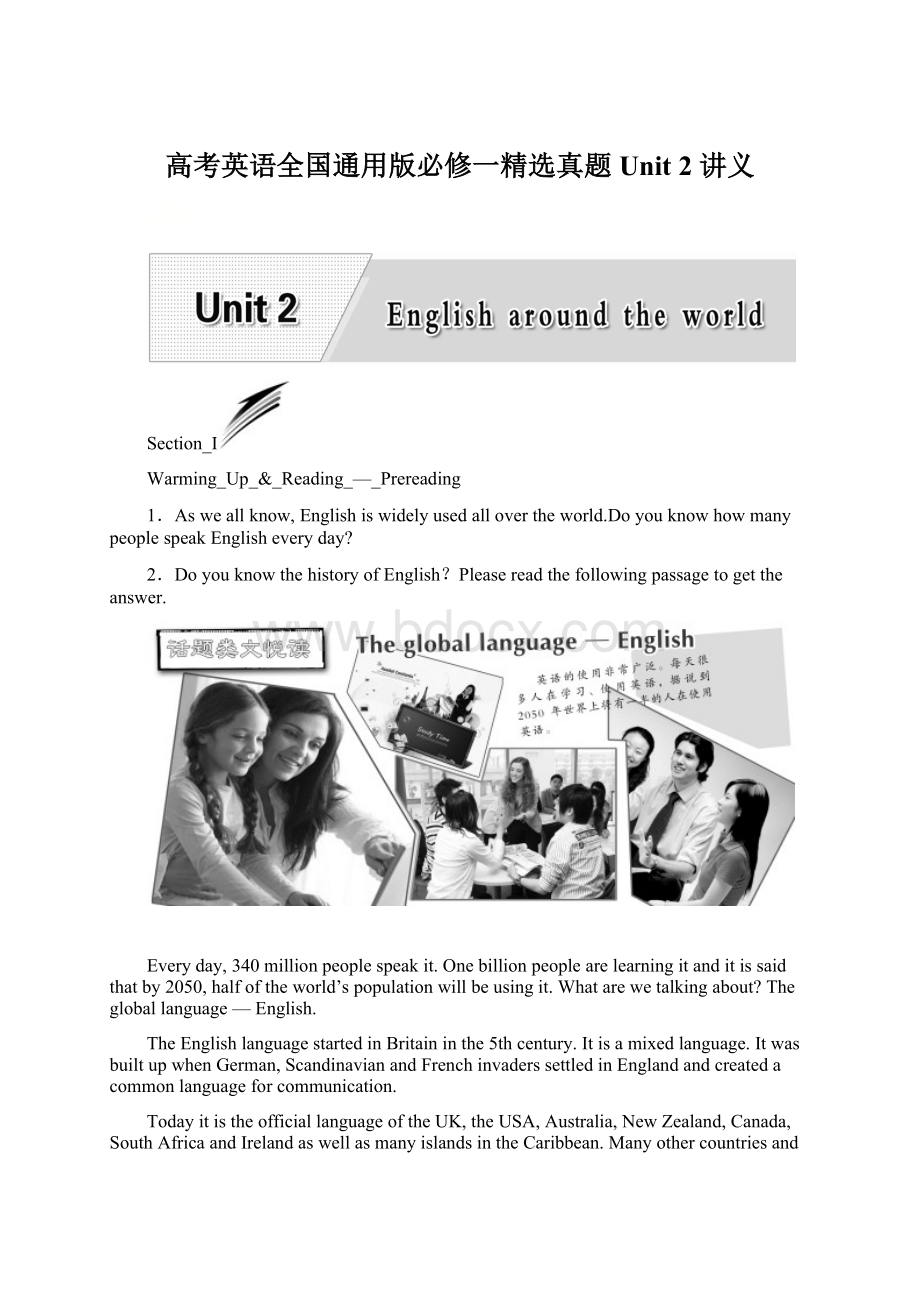高考英语全国通用版必修一精选真题 Unit 2 讲义Word下载.docx
《高考英语全国通用版必修一精选真题 Unit 2 讲义Word下载.docx》由会员分享,可在线阅读,更多相关《高考英语全国通用版必修一精选真题 Unit 2 讲义Word下载.docx(77页珍藏版)》请在冰豆网上搜索。

American_English_and_British_English.
(4)Many_Chinese_are_learning_English.
2.WhenyouheartwonativespeakersofEnglish,theymaystillnotspeakthesamekindofEnglish.Lookatthefollowingpicturesandfindoutwhichwordshavethesamemeaning.
go_to_the_pictures_=_go_to_the_movies_(去看电影);
_underground_=_subway_(地铁)
3.Matchthewordsthathavethesamemeaning.
①petrol A.eraser
②flatB.gas
③colorC.apartment
④liftD.elevator
⑤rubberE.honour
⑥honorF.colour
⑦picturesG.movies
⑧undergroundH.subway
答案:
①~⑤ BCFDA ⑥~⑧ EGH
FastReading
Scanthetextandthenchoosethebestansweraccordingtothetext.
1.SomeBritishpeopleweretakentoAustraliaandEnglishbegantobespokeninbothcountriesin________.
A.the18thcentury
B.1620
C.the1600’s
D.the19thcentury
2.WhatwillhappentothenativeEnglishspeakersiftheyspeakdifferentkindsofEnglish?
A.Theycanunderstandeachother.
B.Theycan’tunderstandeachotheratall.
C.Theymaynotbeabletounderstandeverything.
D.Theyneedanexplanation.
3.WhogaveaseparateidentitytoAmericanEnglishspelling?
A.Shakespeare. B.SamuelJohnson.
C.NoahWebster.D.Britishsettlers.
4.FromParagraph3weknowthattheEnglishlanguagewasonceinfluencedby________.
A.theChineselanguage
B.peoplefromSouthAfrica
C.peoplefromSouthAsia
D.bothGermanandFrench
5.Fromthelastparagraphwecanseethattheauthor________.
A.isquitesurethatChineseEnglishwillbecomeoneoftheworldEnglishes
B.hasnoideawhetherornotChineseEnglishwillbecomeoneoftheworldEnglishes
C.thinksthatgovernmentandeducationplayanimportantroleinEnglishlearning
D.feelsverysatisfiedtoseemoreandmoreChinesepeoplearelearningEnglish
1~5 AACDB
CarefulReading
1.What’sthemainideaofthetext?
Thetextmainlytellsusthedevelopment/historyoftheEnglishlanguage.
2.Readthetextandthenmatcheachparagraphwithitsmainidea.
Paragraph
Mainidea
A.Alllanguageschangewhenculturescommunicatewithoneanother.SodoesEnglish.
B.HowEnglishspread(传播)inthepast.
C.Englishspeakerscanunderstandeachothereveniftheydon’tspeakthesamekindofEnglish.
D.Bythe19thcentury,twobigchangesinEnglishspellinghappened.
E.EnglishisspokeninmanycountriesinAfricaandAsia.
Paragraph1
Paragraph2
Paragraph3
Paragraph4
Paragraph5
Paragraph1~5 BCADE
3.Readthetextanddecidewhetherthestatementsaretrue(T)orfalse(F).
①Attheendofthe16thcentury,nearlyalltheEnglishspeakerslivedinEngland.(T)
②ItisbecausetheculturesmeetandcommunicatewitheachotherthattheEnglishlanguagechangesanddevelops.(T)
③Now,IndiahasthelargestnumberofEnglishlearners.(F)
④Thelanguageofthegovernmentisalwaysthelanguageofthecountry.(F)
⑤EnglishisoneoftheofficiallanguagesusedinIndia.(T)
Summary
Fillintheblanksaccordingtothetext.
SowhyhasEnglishchanged1.overtime?
Actuallyalllanguageschangeanddevelop2.whenculturesmeetandcommunicatewitheachother.AtfirsttheEnglishspokeninEnglandbetweenaboutAD450and1150wasverydifferentfromtheEnglish3.spoken(speak)today.ItwasbasedmoreonGerman4.thantheEnglishwespeakatpresent.ThengraduallybetweenaboutAD800and1150,Englishbecame5.less(little)likeGermanbecausethose6.whoruledEnglandspokefirstDanishandlaterFrench.ThesenewsettlersenrichedtheEnglishlanguageand7.especially(especial)itsvocabulary.Sobythe1600’sShakespearewasabletomakeuseofa8.wider(wide)vocabularythaneverbefore.In1620someBritish9.settlers(settle)movedtoAmerica.Laterinthe18thcenturysomeBritishpeopleweretakentoAustraliatoo.Englishbeganto10.be_spoken(speak)inbothcountries.
Discussion
1.WhydoyouthinkpeopleallovertheworldwanttolearnEnglish?
Students’_answers_may_vary.They_may_include_any_of_these_reasons:
_to_use_computers_and_the_Internet;
_to_trade;
_to_learn_in_Western_universities;
_to_read_academic_journals_etc.
2.WhydoyouthinkmorepeopleintheworldnowwanttolearnChinese?
_as_a_result_of_China’s_growing_economic_power;
_as_a_result_of_China’s_growing_influence_in_the_UN;
_to_trade_with_China;
_to_move_some_branches_of_Western_companies_into_China.
Section_Ⅱ
_Reading_—_Language_Points
(一)词义配对
1.base A.takingplacebyaseriesofsmallchangesoveralongperiod
2.gradualB.whoorwhatsb./sth.is
3.identityC.nearertotheendofaperiodoftimethanthebeginning
4.latterD.asetofroomsusedforaholiday
5.voyageE.totalnumberofwordsthatmakeupalanguage
6.apartmentF.apersonborninaplace,country,etc.,andassociatedwithitbybirth
7.NativeG.alongjourney,especiallybyseaorinspace
8.vocabularyH.thepartonwhichitrestsorstands
1~5 HABCG 6~8 DFE
(二)根据构词法(�ly,�ing,�al)写出单词
9.actual(adj.)→actually(adv.)实际上;
事实上
10.spell(vt.)→spelling(n.)拼写;
拼法
11.fluent(adj.)→fluently(adv.)流利地;
流畅地
12.office(n.)→official(adj.)官方的;
正式的;
公务的
1.nativeadj.本国的;
本地的;
与生俱来的n.本地人;
本国人;
本地的动物或植物
★背诵佳句培养语感
(教材原句)NativeEnglishspeakerscanunderstandeachothereveniftheydon’tspeakthesamekindofEnglish.
以英语作为母语的人,即使他们所讲的语言不尽相同,也可以相互理解。
(鲜活例句)Areyouanativehere,orjustavisitor?
你是本地人,还是只是名游客?
(鲜活例句)TomisanativeEnglishman.
汤姆是个土生土长的英国人。
★归纳拓展全析考点
benativeto 原产于
one’snativecountry/land/language某人的祖国/故乡/母语
beanativeof...……的人;
产于……的动物或植物
①ThegiantpandaisnativetoChina.
大熊猫原产于中国。
②Hereadapoeminhisnativelanguage.
他用母语朗读了一首诗。
③Thekangaroois_a_native_ofAustralia.
袋鼠是澳大利亚的本土动物。
2.actuallyadv.实际上;
事实上(=infact)
(教材原句)Actuallyalllanguageschangeanddevelopwhenculturesmeetandcommunicatewitheachother.
事实上,当不同的文化互相交流渗透时,所有的语言都会有所变化、有所发展的。
(鲜活例句)Helookedcalm,butactuallyhewasverynervous.
他看起来很镇定,但实际上却非常紧张。
(鲜活例句)Shesaysit’sagoodfilm,thoughshehasn’tactuallyseenit.
她说这是部好电影,尽管实际上她没看过。
infact=asamatteroffact=actually实际上;
As_a_matter_of_fact/In_fact/Actually,_Idon’tknowthetruth.
实际上,我不知道事实的真相。
3.basevt.以……为根据n.基部;
基地;
基础
(教材原句)ItwasbasedmoreonGermanthantheEnglishwespeakatpresent.
当时的英语更多地是以德语为基础,而我们今天说的英语不是。
(鲜活例句)Theteacherbasedthebookonhisownschoollife.
那位教师根据他自己的校园生活写了这本书。
(鲜活例句)Sheusedherfamily’shistoryasabaseforhernovel.
她以她的家族史作为小说的素材。
base...on/upon...把……建立在……的基础上
bebasedon/upon以……为基础/依据
①Oneshouldalwaysbasehisopiniononfacts.
一个人应该始终以事实为依据来发表自己的观点。
②Thereportisbasedentirelyonfacts.
这篇报道完全属实。
4.latteradj.较后的;
后半的;
(两者中)后者的
(教材原句)ThelattergaveaseparateidentitytoAmericanEnglishspelling.
后者体现了美国英语拼写的不同特色。
(鲜活例句)Doeshewalkorswim?
Thelatterseemsunlikely.
他是散步还是游泳?
后者看来不可能。
(鲜活例句)Ofwritinganddrawing,Ipreferthelatterone.
对于写作和绘画,我更喜欢后者。
theformer...thelatter... 前者……后者……
lateadj.&
adv.迟的(地);
晚的(地)
lateradj.后期的;
较后的
adv.后来;
较晚地
latestadj.最新的;
最近的
latelyadv.(=recently)最近;
近来
①JaneandCatherinearemyfriends.Theformerisateacher;
thelatterisadoctor.
简和凯瑟琳是我的朋友。
前者是老师,后者是医生。
②Wehaven’theardfromhimlately.
我们最近没收到他的来信。
③Haveyoueverheardthe_latest_news?
你听到最新的消息了吗?
(语境串记)AnnieandHankarrivedalmost4hourslatethanplanned.Later,thelatterwenttoseethelatestmovielatethatevening.
那晚,安妮和汉克比原计划晚到了将近四个小时。
后来,汉克深夜去看最新的电影了。
5.frequentlyadv.常常;
频繁地
(教材原句)Languagesfrequentlychange.
语言经常变化。
(鲜活例句)Busesrunfrequentlybetweenthecitycenterandtheairport.
公共汽车频繁地往来于市中心与机场之间。
(鲜